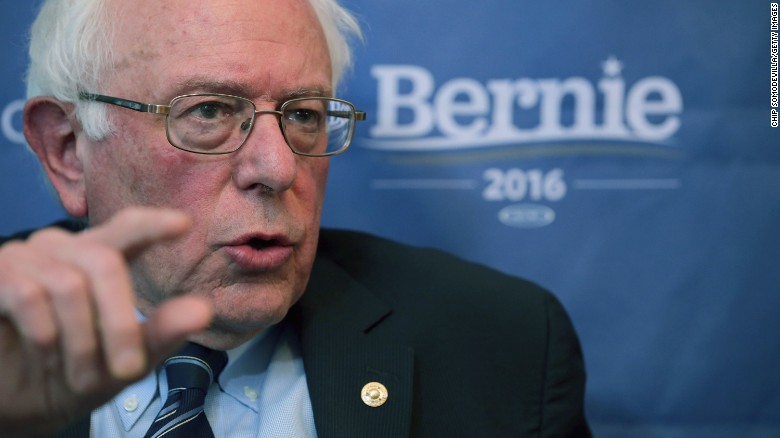
JUSTIN SULLIVAN/GETTY IMAGES
Democratic Presidential candidates Hillary Clinton and Sen. Bernie Sanders (I-Vt.) debate on April 14, 2016 in Brooklyn ahead of the New York primary to be held April 19.
Sanders’ Democratic debate comments on Israel’s Benjamin Netanyahu and the Palestinian conflict echo those that got Simone Zimmerman suspended.
Huffingtonpost 04/15/2016 01:44 am ET | Updated 10 hours ago
Sen. Bernie Sanders (I-Vt.) argued during Thursday’s Democratic debate that the Palestinian people should be treated with dignity and that the United States shouldn’t always kowtow to Israeli Prime Minister Benjamin Netanyahu. Hours earlier, Sanders’ campaign suspended its new Jewish outreach director for advocating the exact same positions.
The ninth debate between Sanders and former Secretary of State Hillary Clinton featured a heated discussion about whether Israel’s invasion of Gaza in the summer of 2014 was a disproportionate response to rocket attacks fired into its territory by Hamas, as Sanders has said it was.
It was a seminal campaign moment, made more salient because it happened in New York, a state where Jews comprise a larger share of the Democratic primary electorate than elsewhere.
Clinton argued that Israel had a right to defend itself from terror attacks and blamed the Palestinians for failed peace negotiations. Sanders said something relatively sacrilegious for an American politician — that Netanyahu “is not right all of the time.”
“As somebody who is 100-percent pro-Israel ... in the long run, if we are ever going to bring peace to that region, which has seen so much hatred, and so much war, we are going to have to treat the Palestinian people with respect and dignity,” Sanders explained. “I believe the United States and the rest of the world have got to work together to help the Palestinian people. That does not make me anti-Israel. That paves the way, I think, to an approach that works in the Middle East.”
This is what Simone Zimmerman, Sanders’ now-suspended Jewish outreach director, said she believes. And it’s a good distillation of what J Street, the progressive advocacy group fighting for a two-state solution and against inertia in the American Jewish community, believes. (Zimmerman was president of J Street’s campus arm, J Street U, while in college.)
As The New York Times reported Thursday evening, Sanders’ campaign suspended Zimmerman just two days after it hired her, after the conservative Washington Free Beacon published a past Facebook post of hers in which she wrote, “F—- you Bibi,” using Netanyahu’s nickname, and described the Israeli leader as “arrogant, deceptive, cynical” and “manipulative.” She criticized Netanyahu for trying to “derail” the Iranian nuclear negotiations and for leading the charge into Gaza, where roughly 1,500 Palestinian civilians were killed during the 2014 invasion.
(President Barack Obama also seems to agree with Zimmerman: He has complained about having to deal with Netanyahu, and a member of his administration reportedly called the prime minister “chickenshit.” In turn, Netanyahu’s spokesman has called Obama anti-Semitic and Secretary of State John Kerry “childish.” Obama and Netanyahu’s personal relationship, setting aside their countries’ working relationship, is the worst ever between an American president and an Israeli prime minister.)
Zimmerman’s suspension suggests a couple of things, including that Sanders’ campaign does not vet staff members and that it feared alienating New York’s Jewish voters if it didn’t respond to the calls for her firing.
“The smear campaign being waged against Simone Zimmerman is a reflection of how out-of-touch the American Jewish establishment is with the Jewish community,” said Yonah Lieberman, who co-founded IfNotNow with Zimmerman and others. The group is dedicated to ending the American Jewish community’s support for the occupation of the Palestinian territories.
“This is not the first sign of this disconnect — it just the most blatant example of the American Jewish establishment trying to intimidate and silence young people acting on the very Jewish values we were taught by our community,” Lieberman continued. “The Jewish establishment won’t stand for anyone criticizing Israel — no matter the truth or reason. When young Jews call for freedom and dignity for the Palestinians, the establishment can only respond with intimidation and fear.”

If Not Now protesters gathered outside of the Verizon Center where Donald Trump and other Republican Presidential candidates spoke during the American Israeli Public Affairs Committee convention in Washington, USA on March 21, 2016.
Those who would otherwise have been thrilled with Sanders’ debate rhetoric about being more “even-handed” in approaching the Israeli-Palestinian conflict were instead furious with him for suspending Zimmerman.
Max Berger, another IfNotNow co-founder, started an #IStandWithSimone hashtag campaign on Twitter, which picked up more tweets as Sanders spoke during the debate.
Sanders’ comments about the Israeli-Palestinian conflict during the debate would have made waves at the American Israel Public Affairs Committee’s annual policy conference last month in Washington. He gave his stellar AIPAC speech at a high school in Utah, speaking at length about how settlements are counterproductive to peace. Clinton, in contrast, mentioned Israeli settlement construction just once in her AIPAC remarks and said the sorts of things that AIPAC supporters love to hear.
Sanders criticized Clinton for “barely mentioning” the Palestinians.
“I heard virtually no discussion at all about the needs of the Palestinian people,” he said. “Almost none in that speech. ... Of course Israel has a right to defend itself, but long term, there will never be peace in that region, unless the United States plays an even-handed role, trying to bring people together, and recognizing the serious problems that exist among the Palestinian people.”
Clinton responded: “Describing the problem is a lot easier than trying to solve it.”
“I was the person who held the last three meetings between the president of the Palestinian Authority and the Prime Minister of Israel … and I was absolutely focused on what was fair and right for the Palestinians, I was absolutely focused on what we needed to do to make sure the Palestinian people had the right to self government ... and get an agreement that will be both fair to the Israelis and the Palestinians without ever undermining Israel’s security,” she added.
Clinton capped her defense by arguing, “Nobody is saying that any individual leader is always right.”
Said Sanders: “There comes a time when if we pursue justice and peace, we are going to have to say that Netanyahu is not right all of the time.”
That’s the sort of tough talk that might get Sanders fired from his own campaign.










